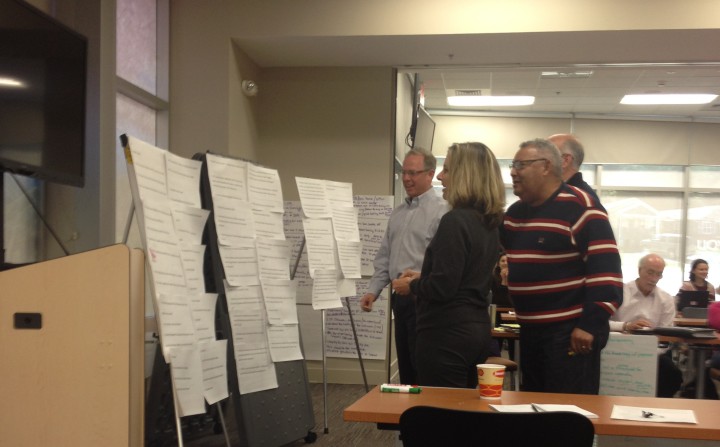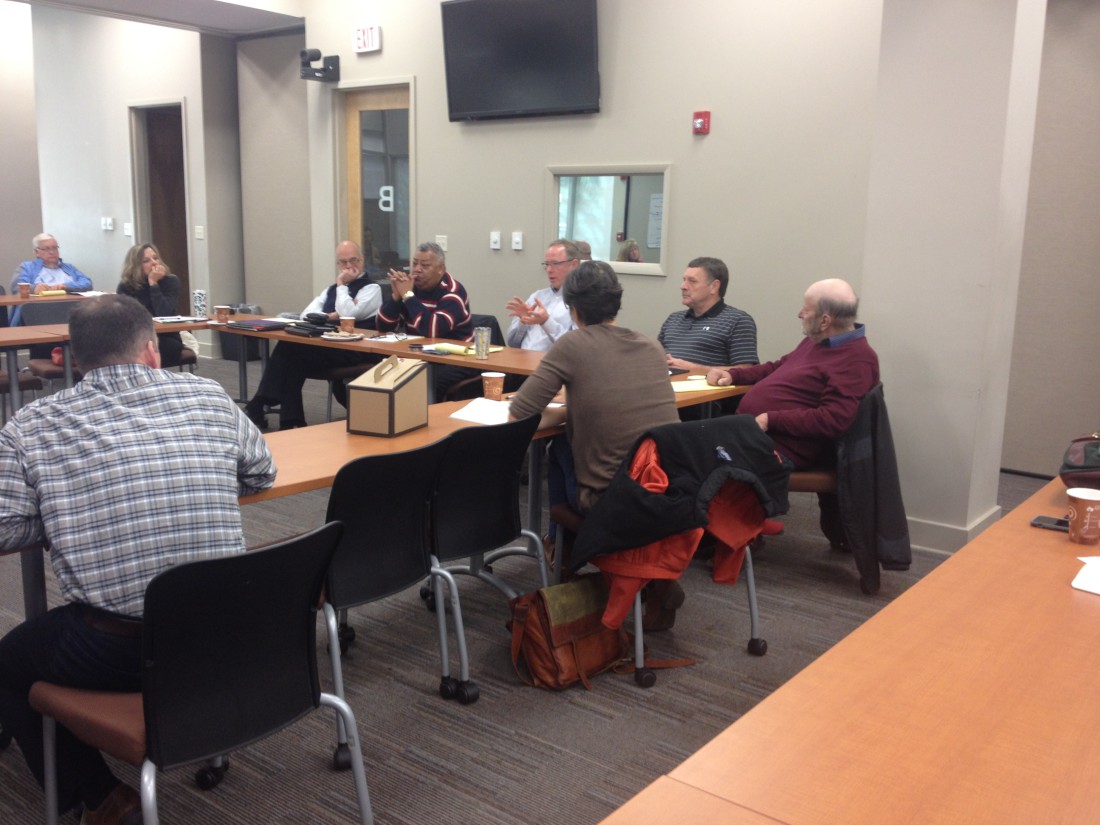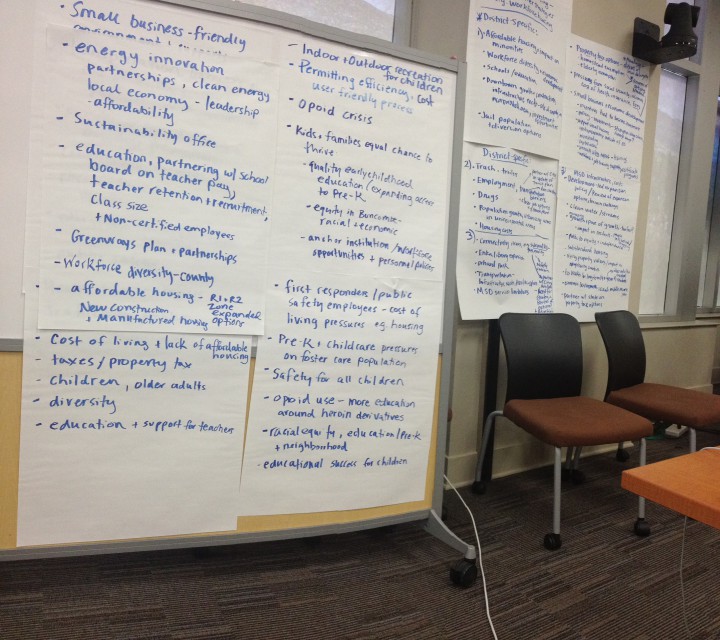Buncombe County commissioners hunkered down for four hours to talk about their goals for the upcoming years during a retreat on Friday, Feb. 17. Topics ranged from increasing teacher pay to expanding access to preschool, but no official action was taken. Chair Brownie Newman said, “Let’s identify what key ideas and goals commissioners want to focus on. The way I’m thinking about it is goals for 2017 and 2018 — you don’t get them all done in a year. What is it we want to get across the finish line the next 24 months?”
Differing priorities
Commissioners went one by one identifying their priorities and district needs. Commissioner Joe Belcher kicked off by stating, “My concern is making sure kids in communities throughout the county have access to good recreational outlets. Making sure we are keeping up with the need in the community for outdoor and indoor recreation.” He added that he’d like to look at how other municipalities parcel out parks throughout their respective jurisdictions.
Belcher also said, in light of the development boom, the county should look at its permitting procedures to make sure they are running “smooth and quick.”
Commissioner Jasmine Beach-Ferrara opened by saying, “My driving priority and passion is looking at what we can do to make sure kids have equal chance to thrive. That’s where specific policy comes from.” She then noted three specific areas of concern: expanding access to early childhood education, promoting equity in Buncombe County and having the county employ a more diverse workforce.
Next, Commissioner Ellen Frost expressed concern about wages for public safety employees. “The fact is most public safety employees have to have a second job in order to live here. I would like to see a boost in pay for them,” she said. Frost also noted concern about the opioid epidemic and said she would like the county to investigate an initiative that mandates that doctors tell patients opioid pills are a heroine derivative. “It’s up to us to tell people it’s a heroin derivative,” she urged.
Racial equality, education and expanding preschool topped Commissioner Al Whitesides priorities. He went on to state the county needs to pay better attention to existing small businesses. “We spend time bringing business to Buncombe County, and we need that. But existing small business is where a lot of the jobs are. They’re going to hire the majority of the people. It’s not the big-box firms that are going to do it,” he said.
Whitesides wrapped up his priorities by saying he wants to address the transportation barrier. “Workers who work in Asheville can’t afford to live in Asheville; they live in the county because it’s cheaper. But a problem is they can’t afford rent and a car. We need to look at our transportation system; what can we do with our bus system to get people to and from work?”
“I know we can’t do a lot about it, but our highway traffic is a problem. We’ve got to send a message,” said Commissioner Robert Pressley, who added increasing resources for teachers, expanding public safety and addressing opioid use as his other priorities.
Commissioner Mike Fryar said he doesn’t have a big list and just wants to give people a break. “[People] want a break on what it costs to live, on taxes. I want to look for ways to help the older people to stay in Buncombe County. I want to help kids, I’m 100 percent behind that,” he said.
Fryar then specifically mentioned affordable housing as a need. “There’s not any affordable housing in Buncombe County. I’m sorry, but it’s a problem. What can you do about it?” he asked while partially answering his own question by stating permitting costs are too high. “How much does that add to the cost of each apartment?” he asked in regard to per-construction costs.
Newman said the Energy Innovation Task Force, a partnership with Duke Energy, the city of Asheville and others, is one of his tip priorities. “I’m excited we have this collaboration. I think it has the potential to make a difference locally. I think it also has the potential to be a model for the state and the nation,” he said, touting its potential economic benefits.
Newman also homed in on continuing to increase teacher pay as a top priority. “I think the pay raise we did last year, in the big scheme of things, it’s not that much money, but I think it sent a very important signal that we care and want people to stay in classrooms. We have a lot of additional work to do to keep good teachers in our classrooms,” he said.
Diversity and infrastructure investments
Frost identified the diversity of county employees as another issue of concern for her. “Our numbers are terrible. We are a lily-white organization. We have to do better,” she admonished.
Whitesides added that many minorities in the community can’t afford to live here. He also said that a diverse workforce will pay off in attracting new businesses. “This hit me between the eyes,” he said of his time on the Economic Development Committee. “We were entertaining a new company looking to come to Asheville, and [the owner] wanted to know how comfortable gays, Muslims, African-Americans and others would be in our community. He wanted to make sure it’s a welcoming community.”
And while Whitesides wants to see improvement, the county is “eons ahead of other communities, especially in North Carolina.”
Newman next touched on infrastructure projects on the heels of a conversation about a lack of sidewalks, an issue creating connectivity gaps. He said the city is at an advantage for getting sidewalk projects. “They have the staff and the funding and are set up to leverage federal and state dollars. Counties aren’t set up the same way, so we need to think about how we are going to do it if we expand,” he said, while noting the county won’t become flush with sidewalks, but it can certainly identify hot spots.
Newman then brought up the fact the city of Asheville is updating its transportation plan, and it would be wise for the county to collaborate. “The city runs transit in the area. If we want improvement, there needs to be a partnership. It’s a very expensive service to provide,” he said, noting that even expanding a single route can cost millions of dollars in staffing and maintenance. “It’s expensive, and we need to set realistic goals. We can’t provide public transit to all corners of the county, but we can expand to places where density is viable.”
Too big to fail
Pressley then floated the question, “Is Asheville growing too fast?” He said when he travels the country, many people ask him that.
Belcher then posed another question, “Is there more concentration on the growth than the people that are here? I think it’s true in some way.”
Beach-Ferrara added yet another query: “The question is who is being left behind. For me, it’s growing too fast if people don’t have food on the table and a safe roof over their head. Who is struggling, and how can we serve and help them?” she wondered.
Those questions, along with some other discussion, built the foundation for commissioners to wonder if they can figure out how to give property tax breaks for elderly, disabled and lower-income residents. However, county staff noted that homestead exemptions have to be approved at the state level and would have to apply to all 100 North Carolina counties.
Newman responded, “Can we give other discounts? Those are important policy issues, and we should have those conversations with our legislators. It’s something there haven’t been many conversations about.” To that end, staff members said they would work on setting up a meeting with legislators as well as explore other tax break options and what other states are doing to mitigate rising property tax costs on certain populations.
Economics of community college
A talk about the appropriate use of economic development incentives turned into a conversation about attracting midlevel-paying jobs and how A-B Tech can expedite job training.
Newman said he wants to raise the amount that employers receiving economic development incentives pay their workers while also looking to expand incentives, such as microlending, to existing small business.
Frost noted that bringing in companies that pay high-level salaries can have the unintended consequences of pricing middle-class people out of the county.
Whitesides then pivoted the conversation, stating, “I’m not sure how much support we are getting from our community college. When I look at the [enrollment] numbers, they are going down.” He said the need for employees in the county should not translate to dwindling enrollment, noting it seems “out of kilter.” Whitesides suggested A-B Tech set up more programs to support small businesses and asked, “Are they giving us the support we need for this century?”
Fryar then said the problem, in his view, is the insistence of creating more and more two-year programs. “I talked with a manufacturer about their needs, and the A-B Tech people kept telling me about two-year programs. But the manufacturer needs maintenance people. Finally, I said, ‘Offer a five-month certificate.’” Fryar went on to say he knows of at least 10 manufacturers that need maintenance people and said he’s also trying to get a repair certificate for airplanes at A-B Tech, citing it as another job-ready industry.
Preschool purview
Beach-Ferrara brought up her policy pet project of expanding preschool in Buncombe County. “[It] works, and the data shows that. It has short-term benefits and helps over the duration of their life. It’s a great way to invest resources, and the return on investment is great longitudinally,” she said.
Currently, an organization called the Asheville-Buncombe Preschool Planning Collaborative is working on the logistics of incrementally rolling out more accessible and affordable preschool across the county. Xpress takes an in-depth look at the group’s effort in next week’s (Feb. 22) issue.

Procedural moves
Commissioners also discussed changing the way they deal with budget items on the consent agenda, noting some of those items are worth public discussion. After some talk, the group asked county staff to put all capital items and any budget item valued more than $250,000 on the agenda for discussion and public comment. Commissioners said they might lower the dollar amount later but also noted that any commissioner can ask for any consent agenda item to be pulled for discussion.
Talks then briefly turned to the upcoming budget process. Newman asserted he would like to start budget workshops earlier, if possible, and said, “We all agree we are going to lower the [property] tax rate; where we land on that is still unclear.”
Commissioners then asked county staff to add budget updates during regular meetings ahead of budget workshops set for late March. They also agreed that nonprofits that annually get funding but are asking for significant increases should make presentations, with Whitesides noting, “Taxpayers want more transparency.”
The board is set to convene again for a regular meeting on Tuesday, Feb. 21.







LOL, Fryar talked about taxes. The rest talking about increasing them via spending. Again, the local board and council assume that taxpayers can afford their insanity. They cannot. It only changes when people who are being forced out bite back. And they will.
It’s absurd that Asheville brought up a bond issue to vote considering the amount of growth here. Again, the spending is going to areas that have nothing to do with services. It’s going to special interest.
Are there any data on actual usage of greenways? How many people walk them on a daily (or other) basis? What are peak usage times/days? What are the demographics of the users (age, place of residence, income level)? This is a real call for an answer. Does anyone have this information?
Greenways are now to become economic zones where people can access their needs without cars. The plan of course by the loons is to get as many on buses as possible. They can control mobility, where money is spent, who can and can’t go, so on and so forth. It was never about recreation but central planning and control. Just like good little authoritarians.
If there’s a definition of “loon” then it surely includes “believes buses are an authoritarian plot.” They’re not coming for your g-d car.
Sure they are. They’ll simply tax and fee it to the point of that many cannot afford them. Under the guise of paying for mass transit, roads, blah, blah, blah.
“They’ll simply tax and fee it to the point of that many cannot afford them.”
That’s just delusional. “I can afford to put $10 of gasoline in my car every week but I can’t afford $30 a year for a city vehicle permit” said nobody ever.
First they came for the stick-shifts, and I didn’t know how to work a stick-shift . . .